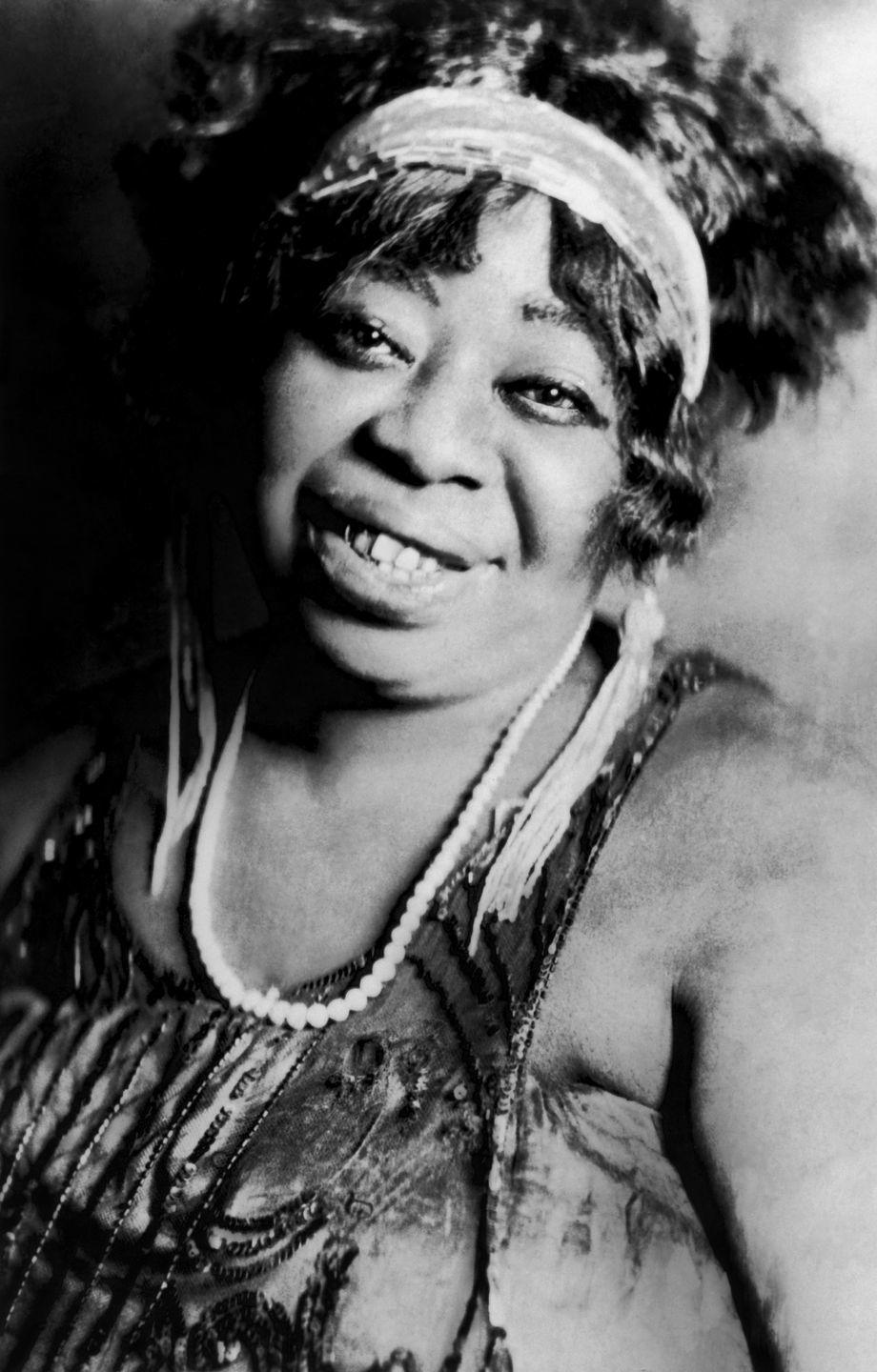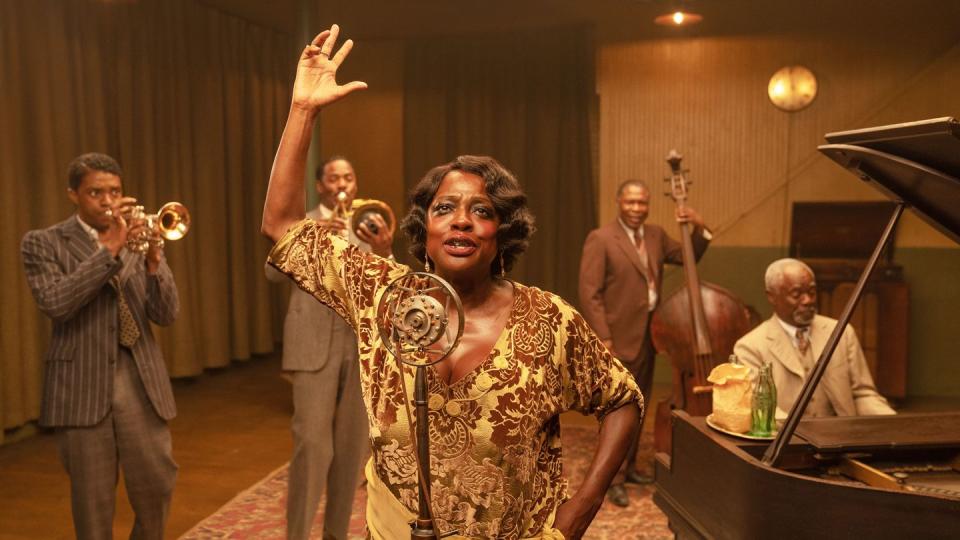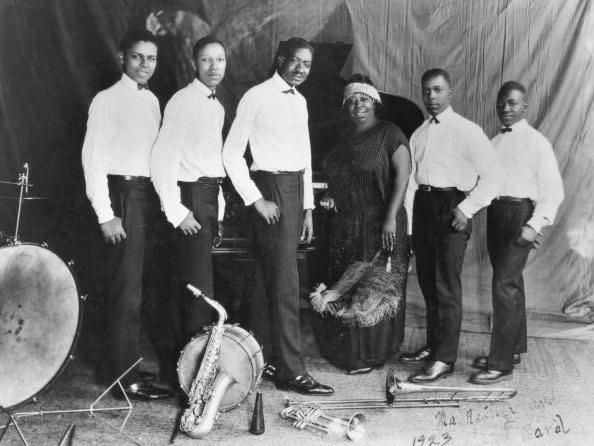Ma Rainey's Bisexuality Was A Revolutionary Act In The 1920s—And It Still Is Now

- Oops!Something went wrong.Please try again later.
Netflix's new film, Ma Rainey's Black Bottom—based on August Wilson's play of the same name (and the playwright's first Broadway hit)— follows the "Mother of Blues" and her band in during a recording session on one sweltering Chicago afternoon. Viola Davis stars as the titular Ma Rainey alongside the late Chadwick Boseman (who some already speculate could win a posthumous Oscar for his performance as the band's trumpet player, Levee.)
"I think one of the reasons that August was drawn to her is [that] she lived outside the rules. And when somebody lives outside the rules, it becomes very clear what the rules are," director George C. Wolfe told The New York Times. "If you were a Black woman, if you waited around for somebody to acknowledge your power, it was never going to happen. So you had to claim your power."
The excellently-cast ensemble film largely centers on the struggle for power between Ma Rainey's blues band and the white record producers who profit from her music. (One scene shows Ma refusing to sing unless the producers buy her a Coca-Cola. "They don't care nothin' about me," she says. "All they want is my voice. Well I done learned that, and they gonna treat me the way I wanna be treated no matter how much it hurt them.")
However, a key part of the film is Ma's relationship with her girlfriend, Dussie Mae, and what happens when trumpet player Levee tries to steal her away from Ma.
Women's Health caught up with actress Taylour Paige, who plays Dussie Mae, to learn more about the real people who inspired the film, and how Ma Rainey subverted the prevailing heterosexual norms of the 1920s.
Ma Rainey was bisexual in real life, but Dussie Mae wasn't based on any of Ma’s real lovers.
"There was no one person that I picked to really [base her character off of]," Taylour tells Women's Health. "I just kind of would pray to my ancestors... I asked for Ma and August Wilson's blessing, and I just asked for all the powers of the universe to come into me to lend myself to the story—because it's not about me. I play [Ma's] lover, and I'm on this adventure with everybody else."

Instead, to create the character of Dussie Mae, Taylour says, "I just zoomed in on Ma and her world and what it would be like to be Black in America in 1920."
The actress explains that she put herself in the mindset of someone whose parents or grandparents were slaves, and who was promised a better life up north. "You're banging on a door, and it's going to lead to something, and you finally get what you think is a key to a door, and you open the door and you're trapped in a closet," she describes. "But in terms of Dussie, I actually just reached from the bottom of me—personalizing someone who wants to be loved, validated, seen, wants to find a way out, wants to be around exciting people and energy and spontaneity."
Though Ma Rainey's lovers aren't documented, she was arrested for hosting an orgy with female members of her chorus, according to PBS, and may have had a relationship with her protegé and fellow Blues pioneer Bessie Smith, per Billboard.
Ma Rainey was also married twice—to two men. She was with her first husband, Will Rainey, for at least 10 years before separating, according to the New York Times. She eventually married again to a younger man, but his name is unknown and other details are scarce.
Ma Rainey openly sang about her affairs with women.
Three of Ma's hundreds of songs contain references to her bisexuality. The most famous example, "Prove It on Me Blues" (1928) was recorded near the end of her contract with Paramount, and contains the lyrics:
Where she went, I don't know
I mean to follow everywhere she goes;
Folks say I'm crooked. I didn't know where she took it
I want the whole world to know.
I went out last night with a crowd of my friends,
It must've been women, 'cause I don't like no men.
Wear my clothes just like a fan,
Talk to the gals just like any old man.
Still, Ma's sexuality wasn't the focus of her music. "I don’t want to overplay the significance of the three songs that Ma Rainey wrote and recorded that had some references to lesbianism and homosexuality," Robert Philipson, who directed the 2011 documentary, T’Ain’t Nobody’s Bizness: Queer Blues Divas of the 1920s, told Collector's Weekly. "That’s a handful out of hundreds and hundreds of blues songs that were recorded. The fact that there were any was remarkable, given the times. You certainly never saw it in any other part of American culture."
Dussie Mae appears to be bisexual in the film and has a romantic moment with Levee. Like Ma, her character is driven by survival.
"We know what the atmosphere is to be alive at this time," Taylour says, noting how it was illegal to be gay, and Black people didn't yet have the rights and protections they fought for in the Civil Rights Movement. "Being around these people, being in a relationship with Ma, it's just like it's camaraderie, it's survival, it's a community," she adds. "I had decided that Ma is her lover, her friend, her mother that she didn't have."
To Dussie Mae, Ma represents the possibility of being successful as a Black woman. "It's like any way out of where I'm coming from is better than what I'm in right now, so I'm going for the ride," she says of her character's motivation.
But there's a dark side to Ma's rise in the music industry—her inability to read meant that white managers took advantage of her. At the end of the film, it's clear that Ma knows that signing is a form of surrender. "So, when her manager asks her to sign [a contract], she knows her power, she's very, very smart, but she doesn't even know what she's signing," Taylour says.

"You're setting your boundaries so that people will finally respect you and see you and value you, but they don't," she continues. "They only value you for this one condition, and they don't even see you as human, but they see you enough to take your voice—literally and symbolically. And then once they get it, you're just trash to them."
Ma Rainey and the other lesbian and bisexual female blues performers were trailblazers.
Even during the 1980s, white male performers like George Michael and Freddie Mercury struggled to come out as queer, so it was pretty revolutionary for a Black woman to be singing about queer love in the 1920s.
Taylour considered it her duty to carry on that revolution through how she portrayed Ma and Dussie's relationship. "I just felt like I [had to] honor those that didn't get to do what they wanted to do, or had to live an oppressed, secretive life," she says. In the 1920s, there was a real risk of being arrested and jailed for homosexuality, and even this year, there's been a disconcerting rise in hate crimes against LGBTQ people, according to the Human Rights Campaign.
"For me, it's just like there are an infinite amount of ways to be a woman and none of the ways make you less than the other, just because it's different than some heteronormative consciousness," Taylour says. "Sexuality is the last thing that [matters]—Ma is a woman, and she happens to sleep with who she wants to sleep with, just like any man does."

You Might Also Like

